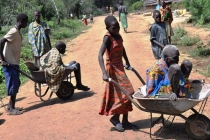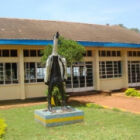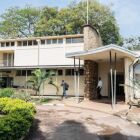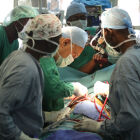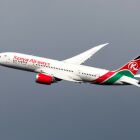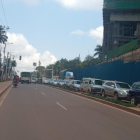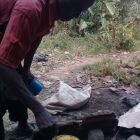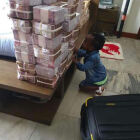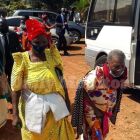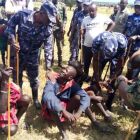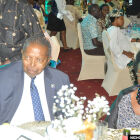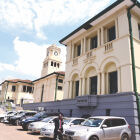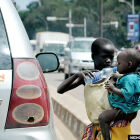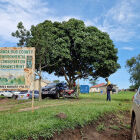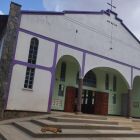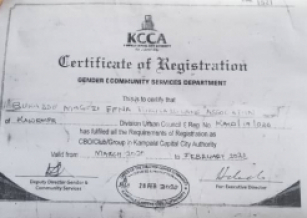OKWEFUGA KWA UGANDA KUFUNIRA WA?
All about Prince Edward The Duke of Edinburgh’s visit to Uganda, this year:
28 March, 2024
Written by Ernest Jjingo
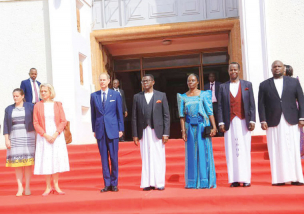 The Duke third from left with the Kattikiro of the Kingdom state of Buganda
The Duke third from left with the Kattikiro of the Kingdom state of Buganda
Last week, the chair of The Duke of Edinburgh’s International Award, Prince Edward, visited Uganda on a three-day visit to grow awareness of the award, in addition to other causes.
The Duke of Edinburgh arrived in Uganda on March 18 and paid a courtesy visit to President Yoweri Kaguta Museveni at State House Entebbe where they discussed issues of mutual benefit, before Museveni agreed to be patron to the award in Uganda.
On March 19, together with the minister of State for Foreign Affairs, Henry Okello Oryem, King Charles III’s younger brother attended the award’s Africa Regional Conference at Speke Commonwealth Resort Munyonyo to highlight the vital role non-formal education and learning can play in a young person’s development, and to discuss the sustainability of the initiative in Africa.
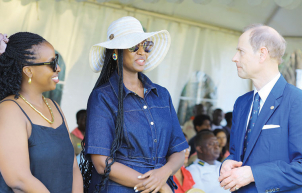
Prince Edward chats with first daughter Diana Museveni (in a hat) and Marcela Karekye, the director GCIC
On Wednesday, his Royal Highness was hosted by the Katikkiro of Buganda Charles Peter Mayiga at Bulange-Mengo to witness the signing of a memorandum of understanding that established a formal collaboration between Buganda Kingdom and The Duke of Edinburgh’s International Award to encourage more young people to take part in the programme.
He then met students participating in the global Non–Formal Education and Learning programme and took part in an Award in Action trip at Uganda Wildlife Education Centre, where award participants are currently volunteering.
He was welcomed by the state minister for Tourism Martin Mugarra, who took him around the zoo to view different animals, and even fed some of them. Prince Edward wrapped up his visit with an evening reception at the British High Commissioner to Uganda, Kate Airey’s residence in Nakasero.
Prince Edward feeds a giraffe at Uwec
During the reception, the national director of the Award in Uganda, Katende Mukiibi said, “The royal visit has come at a time when The Duke of Edinburgh’s International Award Uganda has set an ambitious plan of enabling as many young people as possible in all regions of the country to access the award. The Duke has not only enabled us to mobilise key stakeholders that will support the long-term sustainability of the programme but also re-emphasised the position of Non- Formal Education and Learning in the holistic development of young people.”
During his visit, Edward also interacted with Ugandan youth leaders during a youth dialogue on Sustainable Development Goals which was hosted by Kabojja International School, Buziga. The youth shared their positive impact in the areas of climate, IT, women empowerment and entrepreneurship.
The Duke of Edinburgh’s International Award Uganda is a non-formal education and learning framework that encourages young people to find their purpose, passion and place in the world.
It was launched in Uganda in 1995, initially as the Source of the Nile Award Scheme. It has since expanded to reach young people in more than 20 districts in Central, Eastern, Northern and Mid-western Uganda and it has been delivered to more than 200,000 young people since inception.
The award is delivered through partner youth-focused organizations such as the Scouts, Girl Guides, Red Cross, Boys and Girls Brigades, and several uniformed and non-uniformed school youth groups, among others.
jjingoernest1@gmail.com
Nb
The African Ganda tribespeople have a saying. Mulya Mamba abeera omu navumisa ekika ekitalya Mamba eyo! The islamic religious fanatics do not eat pork do not drink alcoholic drinks but exactly what is on the ground? Prince Edward has a point and probably the Uganda government also for the suffering African children. Many Uganda children unlike that one in the picture with a very nice hat and expensive sunglasses cannot afford the expensive formal education. They are certainaly rotting away in the African villages suffering the informal education schemes their parents manage to put up for their upbringing! Now that this world continues to change at a very fast rate of communication, it is high time these people making lots of money in educating children in this country introduced informal education through social media, radio and TV programmes. Taxes on smartphones for kids should be scraped and data given out to kids of very poor parents. During the 1960s as the British were leaving this African independent country, there were community development centres with no-licensed TV, games and sports, and radio listening installed. It is now 64 years and counting and such credible centres are out of existence! Formal education is the order of the day. And politics as a lucrative business is for the educated African elites who can provide formal education certificates of any kind. It would have helped the attention of the whole world if this elusive Kattikiro of Buganda and the Buganda King to get into their expensive and well guarded vehicles to go and visit with this British royal and their press corps some of the poor and formal schools where children are studying under the shade of mango trees from the intensive heat of the tropical sunshine and heavy rain downpours! They could try to share a school meal with these kids whom they are anxious to award international medals.
UGANDA | INDEPENDENCE | IRAN
While basing from the headquarters, Muhammad Reza Ghezel Sofla, the Cultural Consulate of the Embassy of the Islamic Republic of Iran has wished Uganda a joyous 59th Independence Day and prosperous years ahead:
By World Media
9th October, 2021
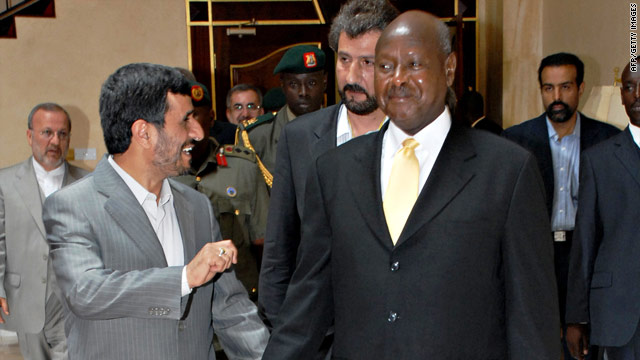 Iranian President Mahmoud Ahmadinejad (left) walks with Ugandan counterpart Yoweri Museveni during his visit on 25 April, 2010.
Iranian President Mahmoud Ahmadinejad (left) walks with Ugandan counterpart Yoweri Museveni during his visit on 25 April, 2010.
“On behalf of the Cultural Consulate of the Embassy of the Islamic Republic of Iran in Uganda, I congratulate the country on the 59th independence anniversary,” Ghezel Sofla said.
He called upon all Ugandans to materialise the goals of independence through patriotism, self-sacrifice, innovations, Unity, and development.
“Uganda is endowed by almighty God and it should be the goal of every Ugandan to devote himself or herself to the beloved Nation, Uganda for internal development,” he said.
Sofla said loving one’s country is part of faith and it should be encouraged all the time since development starts from the inside.
Besides that, he was also confident that the unity and togetherness Iran and Uganda have built will bring a brighter future and an even stronger partnership between the two nations.
Whereas there are exciting times ahead of Uganda, Sofla noted that patriotic and charismatic leaders have a role to play in building that future and in transforming every person’s aspirations into a reality.
Presidents Museveni woos Iranian Investors, says country open for technology transfer, modern agro production:
President Museveni meeting investors from Zanjan provice in Iran
President Yoweri Museveni has said Uganda’s soils are rich for agricultural production but has a gap in agro processing, adding that the country needs investors with the technology and savings to build factories and also the entrepreneurship to run them.
The President was meeting local Iranian investors mainly businessmen from Zanjan Province in Iran led by the governor of Zanjan Province Mohammad Raoofinejad and his deputy Saeed Abbasi at his residence at the Persian Evin Hotel in Tehran.
The group included businessmen interested in investing in projects turning sugarcane waste into ingredients for making tyres and brakes led by the Vice chairman Iran- Africa Economic Cooperation Council Dr. Parvis Karbasi and the President of the Group of Donya Macnoon, Morteza Ruzitalab.
“Uganda is very rich in agriculture production and crops grow easily even without using fertilizer. When we use chemical fertilizer the yields would be much higher. We are working to build a fertilizer factory in Tororo and with our oil we can produce nitrogen from gas. The moment we add fertilizer and also use irrigation, production will be very high,@ he said.
He hailed the business men who are already in the process of building a modern abattoir in Masaka for being enterprising, adding that the quality of Ugandan meat, especially from the long horned cattle in the region is of high quality especially given its yellow fat with is low in cholesterol.
“That meat is a gold mine. If we get a market and process it, it tastes better than meat elsewhere,” he said.
The President said other areas that need agro processing include maize milling and processing for flour and animals feed, saying the country currently exports maize as grain to countries in the region especially Kenya and South Sudan at a loss.
The President welcomed other proposed projects including new technology in affordable housing units, a free trade zone to boost trade in the region and turning sugar cane waste into butanol, a four-carbon alcohol that’s used in paints, adhesives, inks and other solvents. N-butanol is traditionally made from propylene, a petroleum product, and may be converted into other chemicals that are used to manufacture products such as tires, plastics and jet fuel.
The meeting was attended by the Uganda Ambassador M. Kisuule, Members of Parliament from Uganda.
"Now I'm going to engage the United States to hear their version, then come back to and consult with our African brothers whom I represent on the U.N. Security Council," Museveni said.
Uganda is a non-permanent member of the U.N. Security Council.
The country's foreign minister, Sam Kutesa, Sunday denied that Iran had tried to use an oil deal to win Uganda's backing on the Security Council.
"No!" he said, adding, "They have no leverage." Kutesa pointed out that many other countries around the world had companies that could built a refinery in Uganda.
"We are not the agents of Iran or anybody else... Nobody can blackmail us about that oil -- including the Iranians," he said.
Museveni said the day before that Uganda will be not be doing the bidding of the United States, either.
"We are not agents of the West on the U.N. Security Council -- we are representatives of Africa and we follow what Africa decides," he said.
The British-Irish firms Tullow Oil and Heritage Oil have already signed contracts with Uganda to develop its oil reserves, the non-profit group Platform said in a highly critical report in February.
The contracts "place profits before people," in the words of the report's title. Platform called for more environmental protections, greater accountability for military forces protecting oil installations, and more equitable distribution of revenues.
--Sam Kutesa, Ugandan Foreign Minister
Ahmadinejad, who arrived in Uganda on Friday to seek support for his country's controversial nuclear program, said he discussed the sanctions, which he described as a "joke."
"We want Uganda to understand that our nuclear program is for peaceful purposes, but Iran is being denied the right to develop it on baseless suspicions by the West," Ahmadinejad said.
Earlier, during a state dinner, Ahmadinejad accused the West of trying to deny countries the right to nuclear energy.
Museveni, on the other hand, called for a "nuclear weapons-free world," defending nations' rights to have access to nuclear technology, but only for "peaceful purposes" such as medical uses.
"Nuclear weapons are dangerous for humanity -- even more dangerous than all the other previous weapon systems," Museveni said. "We should, therefore, work for a nuclear weapons-free world. This means that those who have these weapons should work to get rid of them under an internationally agreed and verifiable treaty."
Uganda was one of two African nations Ahmadinejad visited this week. He also made a two-day trip to Zimbabwe, where he launched a tractor production line and attended a trade fair.
Zimbabwe President Robert Mugabe said he and Ahmadinejad have the "same policy and same stance -- anti-imperialist, anti-colonialist and a stance to protect our sovereignty and our right of ownership of our resources."
CNN's Ben Brumfield and David McKenzie contributed to this report.
